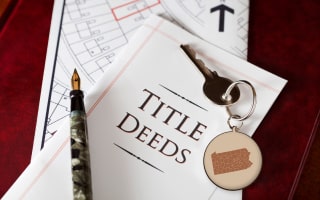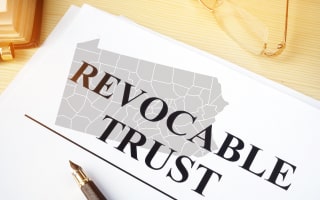How to Find Owners of Properties
in Pennsylvania

There are several ways to conduct a property owner search in Pennsylvania. You can check public records or use online databases and many other resources. If physically looking through records and documents is quite a stretch and complex for you, there are other options you can consider.
Here are some of the methods you can use to conduct a property owner search in Pennsylvania:
Check the County Recorder of Deeds Office
The county Recorder of Deeds (ROD) office is where property deeds, mortgages, and other real estate documents are recorded and stored in Pennsylvania. These records are open to the public. So, you can find the owner of the property for free by following this route.
Simply visit the ROD office in your county and request the information you need from the government officials. You can check the Pennsylvania Recorder of Deeds Association platform for a full list of county offices.
Alternatively, you can also access the ROD's online portal and search for the information using:
- The address
- Parcel number
- Property name (usually for a reverse search)
Currently, several counties have disabled name searches for privacy reasons. But you can still find what you need with just the address and parcel number. For an online search, the portals may require you to create an account or pay a small fee to view the full documents, but most provide access for free.
Here are some county websites where you can get this information:
- Allegheny County
- Buck's County
- Montgomery County
- Delaware County
- Butler County
- Chester County
- Pike County
Access the Pennsylvania Land Records Website
You can also search for property ownership information using the Pennsylvania Land Records Portal. This online portal provides access to public real estate documents from participating counties in Pennsylvania.
Here's how to find the owner of the property by address or any other parameter using the portal:
- Go to the home page and select the county where the property is located from the drop-down menu. (Note that not all counties are accessible via the portal).
- Search for property documents by name, address, or parcel number.
- View and download the document. You can access some documents for free, but more detailed information or downloads may require you to pay a small fee or create an account.
Visit the City or Town Assessor's Office
The assessor's office records property values for taxation purposes and collects information such as the owner's name, assessed value, and property characteristics. The records may not provide historical records. However, you will find several relevant details, like the current owner, property descriptions, and parcel maps.
Many offices offer online databases where you can find property owners by address or parcel number. But if the records are unavailable online, you can visit the office in person to get the information and provide the property's address to make the search easier.
You can find links to various county assessor's offices through the official website of the Assessor's Association of Pennsylvania.
Look through Tax Records
The local tax offices keep detailed records of property ownership, tax assessments, liens, and payment history. Therefore, they are a reliable source of information about a property's owner. At the local tax office, you can request a property's tax information and extract information on the property owner.
County tax offices often maintain online portals where you can search property tax records by owner name, address, or parcel number. These portals usually list the property owner's name, assessed value, and tax payments.
Property tax records will list the property's current owner along with details such as the assessed value and any outstanding taxes. These records are available through the county's assessment office or tax collector's office.
Hire a Title Company/Agency
A title agency is a company that helps ensure that a property title is legitimate and can be transferred without any restrictions. These agencies have access to up-to-date and comprehensive databases of property records.
These companies can help you gain access to a detailed and comprehensive overview of the ownership history and other information regarding that property.
Title companies usually charge a fee for this service. Usually, this costs between $75 and $200, depending on the complexity, location, and title agency.
Other cheaper methods you can try include:
- Asking the neighbors around the property.
- Enlisting help from local real estate agents and real estate lawyers.
- Searching with real estate websites that offer property ownership information.
![]() Engage Commercial Services
Engage Commercial Services
Consider using commercial third-party services if you're looking for a faster and less stressful option. Although they are not as detailed or comprehensive as the official records or databases, they are a good source of property-related information. They are also a good alternative to conducting a property search yourself.
PropertyChecker is one reliable example of these third-party platforms you can use for a Pennsylvania house owner lookup. The platform provides access to a statewide database and detailed information on more than 155 million properties across 3,143 counties within America. This covers past and present title holders and the identities behind LLCs, trusts, and other private entities.
Here's how to search the database:
- Visit the PropertyChecker website.
- Select your preferred search criteria. This can be the property address, owner's name, city, state, phone number, email, or parcel ID.
- Click the search button and wait a few seconds as it scans the database for your results.
- Pick one that matches your search criteria and download the property report.
What Are the Different Types of Property Ownership in Pennsylvania?

The law allows multiple people to own a single property, depending on the type of ownership. Before acquiring the title for any property, knowing the different types will go a long way to help make the right decision.
As you will find out below, each type of ownership has its benefits, risks, and legal implications. Thus, choosing the proper ownership structure for your property will directly influence your access to finance, probate, taxes, and more.
These are the most common types of property ownership in Pennsylvania:
- Sole Ownership
- Joint Tenancy
- Tenancy in Common
- Tenancy by the Entireties
- Life Estate
Below is a breakdown of the common property ownership types, their benefits, and legal implications:
| Ownership Type | Description | Benefits | Legal Implications |
|---|---|---|---|
| Sole Ownership | One person owns the whole property. | The owner has full control over property decisions. | The sole responsibility for debts and liabilities is on the owner. Also, the transfer of estate after the owner passes on is tough. |
| Joint Tenancy | Two or more persons own the property with equal rights and survivorship. | Automatic transfer of ownership to the surviving tenant if one dies. | One tenant can sell their share without the consent of the other; creditors can claim the property for debts. |
| Tenancy by Entirety | This is joint ownership that is available only to married couples to own the whole property together. | Automatic transfer to the surviving spouse upon death without any debt. | It requires mutual consent for transactions; divorce changes ownership to tenancy in common. |
| Community Property | This arrangement refers to equal ownership of marital property. (It is generally not recognized in Pennsylvania) | There is equal ownership of property acquired during marriage. | Properties acquired during marriage are treated as separate unless otherwise stated. |
| Tenancy in Common | Two or more individuals own the property with potentially unequal shares. | Ownership is flexible. Each owner can sell or transfer their share independently. | If one owner dies, shares go to heirs/beneficiaries and not the surviving owners. |
| Condominium Ownership | Ownership of a unit within a larger property with shared common areas. | There is access to shared amenities, maintenance responsibilities, and individual control over units. | Owners must comply with condominium association rules and pay fees; conflicts may arise with other owners. |
| Cooperative Ownership | Persons own shares in a corporation that owns the property. | The housing is affordable, and shareholders make decisions collectively. | The owners do not own real estate directly but shares in a corporation; restrictions on selling shares may apply. |
| Trust Ownership | The property is held by a trustee for the benefit of beneficiaries under a trust agreement. | The assets are protected, and there are estate planning benefits. | The trustee manages the property per the trust's terms, which may limit beneficiaries' direct control. |
| Life Estate | A legal arrangement where one person (life tenant) has rights to use the property during their lifetime, after which it passes to another (remainderman). | The person retains use and benefits during their lifetime. | If the life tenant dies, the property automatically transfers to the remainderman without probate. |
Finding the Owner of a Trust or Corporation that Owns Properties in Pennsylvania

Property ownership is not exclusive to individuals anywhere in the United States. A trust, a C or S corporation, a partnership, or a Limited Liability Company can own real estate properties too. So, when you look up the owner of a property, the results might show a legal entity like a company or a trust.
To find the owner of a trust or corporation, you can:
- Cross-reference public records such as deeds, mortgages, and property tax records.
- Search business databases like LexisNexis and Westlaw.
- Check local business directories in your area, like those maintained by the local Chamber of Commerce.
Here are some ways to find out the owner of a trust or a corporation that owns property in Pennsylvania:
Finding the Owner of a Trust in Pennsylvania
Trusts are not filed publicly like deeds or wills. So, access to them is very limited. You can check with the Register of Wills or Recorder of Deeds in the county where the decedent lived or owned property. Some counties may have records related to trusts if they were involved in estate proceedings.
Finding the Owner of an LLC in Pennsylvania
To find the owner of an LLC in Pennsylvania, you can search the Pennsylvania Department of State website. Here's how to go about the search:
- Visit the Pennsylvania Department of State's business entity search page.
- Enter the name of the LLC in the search box. This will provide you with a list of entities that match your query.
- If available, click on the specific LLC to view detailed information, including the names of members or managers.
Important Note: While some information is publicly accessible, there are limitations on how much detail can be provided about LLC members, especially if they are not directly listed as managers.
Finding the Owner of a Corporation in Pennsylvania
Finding the owner of a corporation in Pennsylvania follows the same process as finding the owner of an LLC. To find the owner of a corporation:
- Go to the Pennsylvania Department of State page.
- Search for the corporation's name or entity ID. You will get a list of entities that match your query. You can also filter by word placement, filing type, and status.
- The results will show various details about each corporation, including its status (active or inactive), filing history, and registered agent information.
- Click on the name of the corporation for more detailed information.
Common Methods of Property Transfer in Pennsylvania

Property deeds are legal documents that transfer real estate property ownership from one person to another. This ownership record may include essential information like the parties' names, property descriptions, and the grantor's signature. The public can access these property deeds.
The most common types of property deeds in Pennsylvania are:
-
Warranty Deed
A warranty deed ensures that the person selling the property holds a good title to the property and warrants against any claims or defects. Therefore, it gives a high level of protection to the buyer. This type of deed is commonly used in residential real estate transactions where buyers want assurance that the property is free from liens and encumbrances to prevent legal issues and liabilities later on.
-
Quitclaim Deed
A quitclaim deed transfers a seller's interest in a particular property without making any warranties about the title. This deed is usually used for transfers between family members, in divorce settlements, or to clear up title issues.
-
Mortgage Deed
A mortgage deed is used to secure a loan by transferring an interest in real property to a lender as collateral for repayment. This type of deed is commonly used in financing transactions where a borrower takes out a mortgage to purchase real estate.
Other types of property deeds that may be applicable in Pennsylvania include:
- Grant Deeds
- Bargain and Sale Deeds
- Mortgage Deeds
Step-by-Step Guide to Property Transfer in Pennsylvania

A property transfer in Pennsylvania is a guided legal process. It involves a series of steps to ensure the legality and validity of every transfer. It is important to understand this process before you start it to avoid any risk.
Here is a breakdown of the steps you will need to take to transfer property in Pennsylvania:
-
Determine the Type of Property Transfer: There are different types of property transfer. So, first, you need to understand the one you are undertaking. Common types are:
- Sale to a new owner
- Gifting without payment of any kind
- Transfer of property upon the death of a person
- Transfer in case of divorce settlement
- Business transfer
- Placing a property in a trust
Each type has specific requirements, so you must pinpoint the one you are undertaking to avoid complications. Understanding the type of transfer will also help you choose the appropriate deed to use. Some deeds are unsuitable for certain transactions, so choosing the correct one is crucial.
- Perform a Title Search: A title search is a simple examination of public records related to a property. The process traces the ownership history, confirms the seller's legal right to sell the property, and ensures there are no outstanding claims, liens, or other encumbrances on the property. In Pennsylvania, this can cost around $60 to $200.
- Draft and Sign a Deed: Signing the deed is an important part of property transfer as it is the deed that transfers the ownership of the property from one person to another. There are different forms of deeds for different types of property transfers. Thus, it is best to hire an attorney to decide on the most appropriate one, draft the deed, and get the parties to sign it.
- Pay Transfer Taxes: Pennsylvania requires a real estate transfer tax on most property transfers. The buyer and seller usually split this tax. The amount required is not cast in stone; it varies across counties. In Lancaster, Cumberland, and Centre counties, 2% of the sale price is required. The buyer pays 1%, and the seller pays the other 1%.
- Record the Deed: After signing the deed and paying the tax, the next step is to record the deed with the county Recorder of Deeds, where the property is located. This can cost around $50 to $150 in Pennsylvania. Recording the deed establishes the new owner's title.
- Inform Relevant Parties: In specific transfers, you may need to inform some relevant parties, such as mortgage lenders, local tax authorities, and the homeowner's association, of the title change.
- Title Insurance Policy Issuance: Finally, it is a good idea to get title insurance to protect you against unforeseen circumstances. In Pennsylvania, this usually costs about 0.5% to 1.0% of the home's sale price.
Property Ownership Guide
- How to Find Owners of Properties in Pennsylvania
- What Are the Different Types of Property Ownership in Pennsylvania?
- Finding the Owner of a Trust or Corporation that Owns Properties in Pennsylvania
- Common Methods of Property Transfer in Pennsylvania
- Step-by-Step Guide to Property Transfer in Pennsylvania
Pennsylvania Homeowner Lookup
- Owner(s)
- Deed Records
- Loans & Liens
- Values
- Taxes
- Building Permits
- Purchase History
- Property Details
- And More!
Property Ownership Guide
- How to Find Owners of Properties in Pennsylvania
- What Are the Different Types of Property Ownership in Pennsylvania?
- Finding the Owner of a Trust or Corporation that Owns Properties in Pennsylvania
- Common Methods of Property Transfer in Pennsylvania
- Step-by-Step Guide to Property Transfer in Pennsylvania